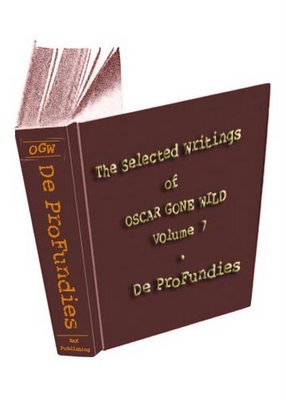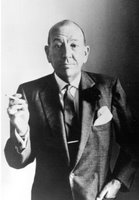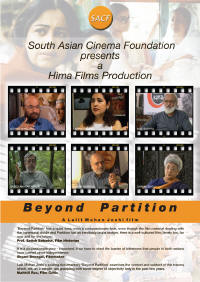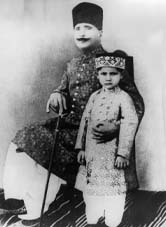The hall was packed for 3 recent sessions at T2F: Ardeshir Cowasjee, Ayesha Siddiqa, and Javid Iqbal (Retired Chief Justice and the youngest son of Allama Iqbal), whose session was preceded by a documentary called Beyond Partition.

Ardeshir's session has been covered well (like most things) on Jehan Ara's blog. And his advice to young Pakistanis ("Leave. Or suffer.") made the Indian press - quoting the Daily Times (where it made the Karachi Edition, only!) - just hours after he uttered these words.
***
Ayesha Siddiqa & the Oxford University Press, as many of you know, had trouble launching her book (Military, Inc.) in Islamabad. While no 'ban' was placed upon it, pressure from the powers that be prevented them from organizing the event at almost every place they tried. The book, for days, was sold almost under the counter by stores that carried it, for fear of offending the unnameable. T2F was unofficially told by the co-organizers at the time of the event that that there were "no guarantees" that it would not get into trouble. Often, such threats - like virus hoaxes that flood our eMail boxes - are more in the minds of the people. But, as the saying goes: "Just because you are paranoid, it doesn't mean they are not out to get you!"
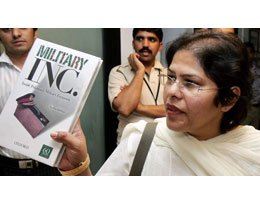
Ms. Siddiqa, while a good conversationalist, with a very pleasant personality, had very little to add to what her study has already revealed. She certainly did not venture into providing more revelations - though she did fill in some details. Her response to many questions was that the questioner read the book first. This was by no means a cheap way to promote her book (already OUP's biggest/fastest seller to date, not counting their reference books). People seemed to constantly ask questions about parts they thought (gathered through hearsay) were in the book - while, often, the view she had expounded in it was quite the opposite of what she was being lumped with.
The session was rather limp, I thought - and
not because the author was. Members of the packed audience kept asking her how we ("we the people") could stop the army swindles, what could be done to send the army back to the barracks, and more such stuff, as if writing this book had now made her the Oracle of Delphi. There were a couple of amusing
energetic exchanges (with the energy generated being more Heat than Light) when certain people insisted upon being heard and the moderator, Tammy Haq, thought they were being irrelevant or delivering speeches, rather than asking questions during the Q&A.
I believe a discussion of the rumours that she and OUP had been threatened or were about to be sued would have added some fun
... (Digression: Mushtaq Yusufi says, "Pakistan is unique in that most rumours about it are true.") ... But such topics were not broached, for obvious reasons. Ardeshir, among the audience (he's a frequent T2F visitor) had his usual cynical interjections, which I enjoyed. What
did come across from the session was that the most popular military personality among civvies was General Dissatisfaction.
***
Beyond Partition turned out to be a good example of a well-made garden variety documentary. It offered a collage of scenes from old and new films interspersed with interviews of Directors, including Shyam Benegal and Sabiha Sumar. Though not ground-breaking in terms of either the format or presentation, it nonetheless held the audience's attention, specially that of the rather large young
shanaakht-searching group present who were not familiar with many of the movies discussed or quoted. I'd say, it was certainly worth a viewing.
Shyam Benegal's assertion near the end of the documentary that there are 3 Indias - the Geographical, the Cultural, and the National - may be true (as it would be for most large countries) ... but to state that the
last-mentioned category included Pakistan and Bangladesh was, IMHO, way out of line. I
would have accepted - within certain parameters - his view
if he had placed the two neighbouring chips of the old block together in the
second category.
The trouble is the widely-held Indian belief that the 2-Nation Theory failed after BD separated -
and I come across this among a variety of people in my trips to India as well as among some Pakistanis -
always seems to assume that its failure means we really were one nation. Sure, the 2-Nation Theory has many detractors and some questionable aspects accordin to them, but the formation of BD could equally well have proved that we are 3 or --- with the passage of time and the further
inevitable break up of large groups of people into smaller ones --- even more nations.
(Anyway, I am no one to speak of these matters since I do not accept ideas of nationhood and identity in the way they are promulgated, anyway.)
The session that followed --- and lasted well after the formal one (moderated by Mujahid Barelvi) was over --- started with Justice Javid Iqbal (JI, from now on) explaining in his still-youthful (at 81!) and passionate manner how Pakistan's current flirtation with Islamic Fundamentalism is a far cry from the view of the Muslim Reformationists (Sir Syed Ahmad Khan and Dr. Allama Iqbal, to name two) who were the catalysts of the final ideas that led to Jinnah sahab's proposals. He also emphasised that the country came about because of Nehru's (and the Congress Party's) obstinacy and conspiracy, more than Jinnah's doings since Jinnah had been an apostle of Hindu-Muslim unity and would not have wanted to see India break up.
Much of what JI said, apart from the above - and the intermittent references to progressive Islam - was the stuff of books and the young members of the audience seemed less interested in it than they were in their own questions. Many were heavily critical of the people and ideas that earlier generations have held in
official high esteem and never questioned. It seems that, despite our break-away from Hindu-dominated India, we have many more sacred cows here, which brings to mind Bhutto's classic quip when he trounced JI in the elections in their co-constituency in Lahore. "I have slaughtered the sacred calf", announced an exuberant ZAB.
Matters that he did not (or could not) tackle were those that questioned the vision - or the alleged lack of it - of the Founding Fathers and the inevitability of a feudal-run state when almost the entire leadership among the Muslims was be
leaguered with Nawabzaadahs, Knights, Chaudharis, and Sardars. The very first comment that came from a young blogger attending the event stated that the 'leaders' had no 'connect' with the people they professed to lead and, like in Manto's famous Toba Tek Singh, many just became Pakistanis overnight in the interior of Punjab, without really knowing or understanding what Pakistan meant. Equally inevitable, it seemed to some, was the fundamentalist-leaning nature of a state created through a separation on the basis of communities that differed from each other
primarily (if not
solely) in religio-cultural practices. A secular Pakistan would most certainly have been a strange thing to carve out of a secular India. An activist wondered aloud whether the Hindu majority - had India been left undivided - could have really trounced or even ignored entirely a sizeable Muslim minority, given that the population of Muslims in India would have been 3 times its current figure with Pakistani and Bangladeshi populations added.
The most alarming remark that JI uttered was in response to the question that, though asked by one young person, echoed the thoughts of many: To what do we owe the mess that Pakistan is in? Without batting an eyelid, JI's odd -
and totally ludicrous - retort was, "The young. Because they have strayed from the values and goals." C'mon, Sir. With apologies and reverence for your seniority, may I remind you that you have meted out Justice; You have been in a position that requires unemotional, cool, logical thinking before passing such sweeping judgements. Be willing to accept that your generation (and mine) passed little to the young in any form or shape worth keeping or being proud of. Corruption, nepotism, lawlessness, slavish boot-licking of foreign powers for personal gains, indecent politics, loot-maar, apathy, personal glorification, hypocrisy, hero-worship, martial-laws, horse-trading, continuing class wars, provincialism, the worst aspects of nationalism, sectarianism, ethnic and linguistic strife, destruction of institutions,
and worse, is all they have seen while growing up. Fortunately for us (and them), there are a few people like Edhi still around (and like Akhtar Hameed Khan in the recent past) for them to understand that even one person can make things happen. This is what will keep
their activism and spirits alive. These are the people whose biographies should replace those of trivial personalities in textbooks so that role models are established early.
If I see any hope, it is in the current set of 20-to-30-somethings who are sick and tired of all they have been short-changed by and who realise that setting this country right is not merely an abstract nationalist-crap-infested duty but a fight for survival for them. I have great faith in them ... and feel that the least we can do in supporting their last ditch efforts to set a new direction is to stop making it difficult, stop wrongly blaming them,
and get out of their way. They have the energy, the will. They'll find a way. It's their world. Neither you nor I should have much say in it. Perhaps our role is one that the following couplet by my father explains best:
Ek hikaayat haeñ, keh iss raah say jaae nah koee,
Kyaa samajhtay ho keh kyaa haeñ meray qadmoñ ke nishaañ
Years ago I had met JI, That was soon after my CD-ROM,
Faiz - Aaj Kay Naam, had been published and Hamdard U had suggested that I do one on the Allama. Though the project died with the dastardly assassination of Hakim Said, JI's recounting of the anecdotes of his father, the irreverent humour, and much else that we discussed had confirmed the fact for me that the Iqbal we knew through state propaganda was a much truncated and deformed version of the man - a strange case where the myth had actually made its hero a lesser being than he probably was.
I asked JI at his very enjoyable T2F session, in closing, how
he felt about this distortion of his father's image.
"Bardaasht karta hooñ aur gaaliyaañ bhi khaata hooñ" (I live with it and suffer verbal abuse for it), he said, laughing.
All in all, a wonderful evening. The debates that raged after he left will go on forever. But should the ghost of partition continue to haunt generation after generation? Do the young really want to inform their future with this past? I'd love their comments on this subject.
Labels: Books, Literature, Media, Pakistan, People, Personal, Poetry, Politics, Rant, T2F, Urdu
